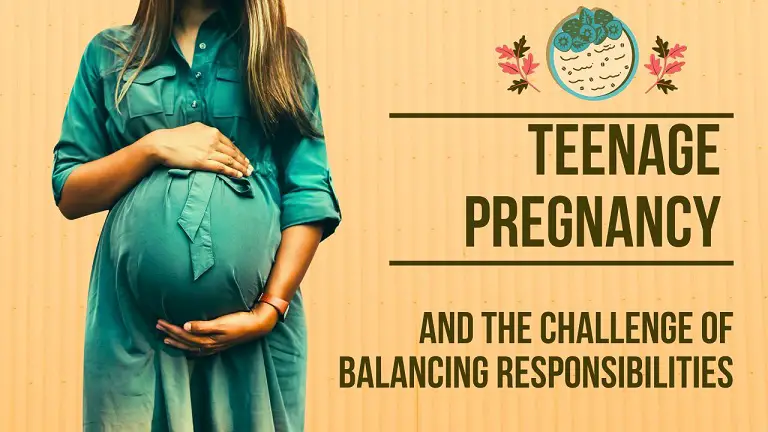Contents
Teenage Pregnancy and the Challenge of Balancing Responsibilities
Teenage pregnancy presents a unique set of challenges that extend beyond the physical and emotional aspects of becoming a parent at a young age.
One of the most significant hurdles faced by adolescent mothers is the daunting task of balancing various responsibilities, from continuing their education to caring for their newborn while navigating the complexities of this life-altering transition.
This article explores the multifaceted challenges of balancing responsibilities for teenage mothers and offers insights into strategies and support systems that can help them navigate this demanding journey.
The Complexities of Teenage Motherhood
Parenthood is a demanding role for individuals of any age, but the challenges are amplified for teenagers. Adolescent mothers often grapple with caring for a child while simultaneously trying to complete their education, maintain social connections, and potentially enter the workforce.
This juggling act can be overwhelming, physically and emotionally taxing, and potentially detrimental to the well-being of both the mother and child.
Continuing Education
One of the most significant responsibilities that teenage mothers must balance is their pursuit of education.
Dropping out of school is a common consequence of adolescent pregnancy, which can have long-term implications for future employment opportunities and economic stability.
However, continuing education is crucial for personal growth, career prospects, and breaking the cycle of poverty.
Balancing the demands of motherhood with the rigors of academic life can be daunting. Teenage mothers may face challenges such as arranging childcare, managing time effectively, and coping with fatigue and stress.
Many educational institutions need more support systems and accommodations for young parents, exacerbating their challenges.
Childcare and Parenting Responsibilities
Caring for a newborn is a significant responsibility that requires round-the-clock attention, patience, and dedication.
Teenage mothers often need more life experience and support networks than older parents may have, making childcare challenges even more daunting.
They must learn to navigate diaper changes, feedings, and the emotional demands of parenthood while prioritizing their physical and mental well-being.
Balancing childcare responsibilities with other aspects of life, such as education or work, can be overwhelming. Finding affordable and reliable childcare options can be a significant hurdle, especially for those from disadvantaged socioeconomic backgrounds or lacking family support.
Financial Stability and Employment
Achieving financial stability is another critical responsibility that many teenage mothers must navigate. Limited education and work experience can make securing stable employment challenging, leading to economic hardship and increased reliance on government assistance or family support.
Balancing the demands of work and childcare can be a constant struggle, as many entry-level jobs may need to offer the flexibility or accommodations required for young mothers.
Additionally, the cost of childcare can consume a significant portion of their income, further exacerbating the financial strain.
Social and Emotional Support
Maintaining social connections and emotional support networks is essential for the teenage mother’s and her child’s well-being. However, navigating these relationships can be challenging amidst the demands of parenthood and other responsibilities.
Teenage mothers may face social stigma, isolation, and lack of support from peers or family members, leading to feelings of loneliness and emotional distress. Balancing time for social activities, self-care, and nurturing relationships can be difficult, potentially putting their mental health at risk.
Strategies and Support Systems for Balancing Responsibilities
Addressing the challenges of balancing responsibilities for teenage mothers requires a multifaceted approach involving various stakeholders and support systems. Here are some strategies and resources that can help adolescent mothers navigate this demanding journey:
Comprehensive Education and Childcare Programs Educational institutions and community organizations should implement comprehensive programs that support teenage mothers in continuing their education while providing childcare services and parenting resources.
These programs can offer flexible scheduling, on-site childcare facilities, and access to counseling and support groups.
Mentorship and Peer Support Networks Establishing mentorship programs and peer support networks can provide valuable guidance and emotional support for teenage mothers.
Experienced mentors and fellow young parents can share insights, offer advice, and give a sense of community and belonging.
Family Support and Counseling: Engaging family members and providing family counseling services can create a supportive environment for teenage mothers.
Open communication, understanding, and shared responsibilities within the family unit can alleviate some of the burdens and promote the mother’s and child’s well-being.
Financial Assistance and Job Training Access to financial assistance programs, job training initiatives, and career counseling can empower teenage mothers to achieve financial stability and independence.
These resources can help them develop marketable skills, explore employment opportunities, and secure reliable sources of income.
Flexible Work Arrangements and Childcare Subsidies Employers and policymakers should consider implementing flexible work arrangements and childcare subsidies for teenage mothers.
These measures can help alleviate the stress of balancing work and childcare responsibilities, enabling young mothers to maintain employment and financial stability.
Community Outreach and Awareness Campaigns Community outreach and awareness campaigns can help combat the stigma associated with teenage pregnancy and promote a more supportive and inclusive environment for young mothers.
These efforts can also educate the public on the challenges faced by adolescent parents and encourage community involvement in providing assistance and resources.
Accessible Healthcare and Mental Health Services Ensuring access to affordable and comprehensive healthcare services, including mental health support, is crucial for teenage mothers.
Regular check-ups, prenatal care, and counseling can address physical and emotional needs, promoting the mother’s and child’s overall well-being.
Conclusion
Teenage pregnancy presents a multitude of challenges, and the task of balancing responsibilities can be overwhelming for young mothers.
However, with suitable support systems, resources, and strategies, these challenges can be mitigated, and adolescent mothers can navigate this demanding journey while pursuing their goals and aspirations.
By fostering a supportive and inclusive environment, providing comprehensive education and childcare programs, offering financial assistance and job training opportunities, and promoting community outreach and awareness, we can empower teenage mothers to overcome obstacles and create a brighter future for themselves and their children.
Thanks for visiting Teenage Pregnancy Feel Free to Give your valuable comments in comment section, and do not forget to share our website.

